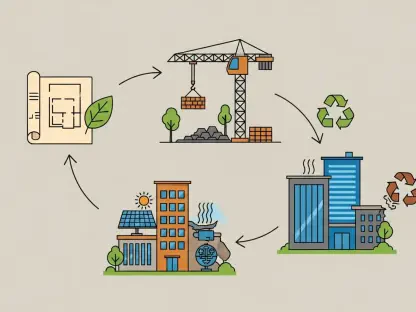The Trump administration has been ordered to resume the funding for two significant climate laws from the Biden erthe Inflation Reduction Act (IRA) and the Infrastructure Investment and Jobs Act (IIJA). This ruling comes after President Trump issued an executive order to freeze allocated funds on his first day in office, marking the start of a broader campaign to dismantle key climate legislation from the previous administration.
Judicial Intervention
Federal Judge’s Ruling
A federal judge ruled that the Trump administration overstepped its authority by pausing the release of funds already awarded under these laws. Judge Mary McElroy of the U.S. District Court for Rhode Island issued a mandate requiring several federal agencies, including the Departments of Energy, Housing and Urban Development, Interior, Agriculture, and the Environmental Protection Agency, to disperse the funds that had been withheld. Her decision emphasized that executive agencies do not have “unlimited authority” to enforce a president’s policy agenda, particularly when it involves legislation that has been legally enacted by Congress.
Judge McElroy’s ruling represents a pivotal moment, contesting the executive branch’s power to unilaterally disrupt federally legislated funding initiatives without clear legal justification. This decision not only reinstates the suspended funds but also sets a precedent concerning the extent to which the executive branch can influence or halt the implementation of laws passed by Congress. The ruling remains in effect as the court continues its examination of the case, indicating potential long-term implications for the administration’s broader objectives regarding climate policy revision.
Executive Authority Limits
The decision underscores the judiciary’s function in defining the bounds of executive power, particularly in relation to the execution of already established laws. It stresses that federal agencies cannot impose a president’s agenda onto legislated programs without deviating from legal stipulations prescribed by Congress. Judge McElroy highlighted that such actions are constrained by statutory frameworks that uphold the principles of separation of powers and checks and balances inherent in U.S. governance.
By reinforcing these legal boundaries, the ruling acts as a safeguard against arbitrary executive decisions that may undercut legislative intent. It ensures that the execution of congressionally sanctioned funds remains secure from sudden changes in administration policies. This sends a clear signal that executive agencies must adhere to the rule of law and maintain procedural propriety when implementing federal laws, thereby preserving the integrity of legislative processes.
Background on Climate Laws
Inflation Reduction Act (IRA)
The Inflation Reduction Act, passed in August 2022, is a cornerstone of the Biden administration’s effort to tackle climate change and transition the U.S. towards a sustainable energy future. It allocates hundreds of billions of dollars toward climate and energy initiatives, encompassing grants, incentives, and loans designed to drive forward renewable energy projects and reduce carbon emissions. A notable feature of the IRA is its provision of substantial tax credits to manufacturers, aimed at meeting domestic production criteria, thereby encouraging investments in U.S.-based manufacturing capabilities.
These tax incentives are tailored to foster a robust environment for green energy innovation, seeking to propel the U.S. into a leadership role in climate technology and sustainable energy production. The IRA’s strategic funding structure is intended to catalyze economic growth in the clean energy sector while simultaneously addressing urgent environmental challenges, thereby establishing a multi-faceted approach to climate resilience and energy independence over the coming years.
Infrastructure Investment and Jobs Act (IIJA)
The Infrastructure Investment and Jobs Act, commonly referred to as the Bipartisan Infrastructure Law, was designed to infuse billions into the nation’s aging infrastructure with a keen focus on sustainability and clean energy projects. This act allocates substantial funding towards the modernization of transportation systems and the development of renewable energy infrastructure. By directing investments into projects that enhance energy efficiency, electrify transportation, and promote green building practices, the IIJA serves as a complementary measure to the Inflation Reduction Act in fortifying the U.S.’s climate mitigation efforts.
Furthermore, the IIJA’s initiatives are aimed at increasing the resilience of critical infrastructure against the adverse effects of climate change. This involves funding for projects that not only reduce the carbon footprint but also bolster the country’s adaptability to extreme weather events. Through targeted investments and collaborative efforts between federal, state, and local entities, the IIJA underpins a holistic strategy to address environmental sustainability while spurring economic activity and job creation in green industries.
Legal Challenge
Nonprofit Organizations’ Role
The pivotal legal challenge to the Trump administration’s executive order was spearheaded by a coalition of six nonprofit organizations. These groups, including the Woonasquatucket River Watershed Council and the National Council of Nonprofits, filed a lawsuit against the federal agencies tasked with administering the frozen funds. Their argument centered on the assertion that the Trump administration’s freeze on funding violated the Administrative Procedure Act by being “arbitrary and capricious.” Judge McElroy concurred with this reasoning, finding that the executive order lacked sufficient legal grounding and procedural due diligence.
The involvement of these nonprofits highlights the critical role that civil society organizations play in holding government actions to account. By initiating this legal action, they sought to protect the continuity of vital climate initiatives and ensure that the funding designated by Congress reached its intended destinations. Their successful challenge emphasizes the importance of legal frameworks in safeguarding public policy objectives and protecting environmental initiatives from abrupt and unilateral executive interventions.
Impact on Nonprofits
The judge’s ruling takes into account the significant adverse effects that the funding freeze had on the various nonprofit organizations involved. These entities rely heavily on federal grants and allocated funds to sustain their operations and advance their environmental agendas. The freeze not only threatened their financial stability but also jeopardized ongoing projects and their reputations within the community. By lifting the freeze, the court’s decision enables these organizations to resume their crucial work without the interruptions caused by policy shifts at the federal level.
Furthermore, the ruling recognizes the broader implications of such administrative decisions on the operational integrity and continued viability of nonprofits. These organizations play a vital role in local and national efforts for environmental protection and sustainability. The prompt reinstatement of funds thus ensures that these initiatives can proceed unimpeded, contributing to the momentum of climate action and the practical realization of legislated environmental goals.
Nationwide Implications
Reinstatement Directive
Judge McElroy ordered immediate compliance with the reinstatement of the frozen funds, emphasizing the need for nationwide relief from the detrimental effects of the funding suspension. Her directive instructed federal agencies to expedite the release of funds and provide updates on their progress, underscoring the urgency of stabilizing the operations of affected entities across the country. This action not only addresses the immediate financial gaps but also sends a clear message about the judicial commitment to uphold legislative intent.
The judge’s decision to enforce rapid compliance reflects an acknowledgment of the critical timing involved in climate-related projects. Delays in funding can have cascading effects on project timelines, stakeholder confidence, and overall environmental impact. By mandating swift action, the court aims to mitigate these potential setbacks and restore the momentum of climate initiatives that are integral to the nation’s broader sustainability goals.
Judicial Assertion of Checks and Balances
The Trump administration has been ordered to resume funding for two major climate laws from the Biden erthe Inflation Reduction Act (IRA) and the Infrastructure Investment and Jobs Act (IIJA). This mandate follows President Trump’s initial executive order, issued on his first day in office, that froze the allocated funds for various climate initiatives. This act of freezing the funds marked the beginning of a broader effort by Trump to dismantle significant climate legislation enacted during the Biden administration. The IRA and IIJA are pivotal in addressing climate change by reducing emissions and investing in sustainable infrastructure projects. Resuming their funding means the continuation of crucial environmental and infrastructure projects intended to curb the climate crisis and foster green job growth. This decision emphasizes the importance of climate action and the need to support policies that mitigate the adverse effects of climate change while promoting economic development through green initiatives.









